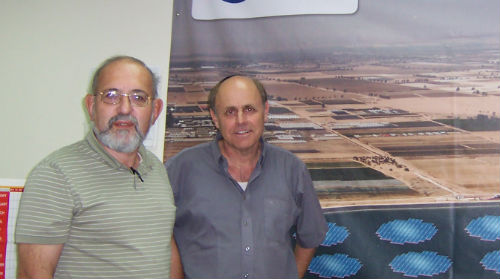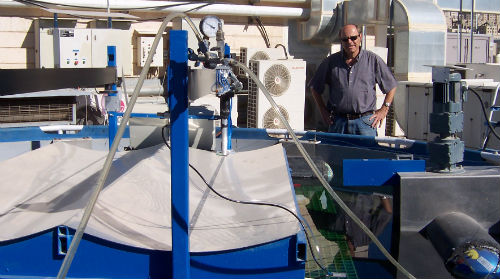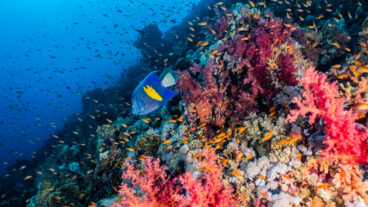Award winning Israeli company Solaris Synergy has designed solar energy grids that can float on water, reducing energy production costs, and preventing water loss.

Generating energy from the sun would be more practical if not for two huge drawbacks: The expense of the silicon material that converts light to electricity, and the large tracts of land needed for solar farms.
By solving both problems – and introducing unexpected side benefits, too – Solaris Synergy captured first place in the Israel National Cleantech Open IDEAS Competition at Tel Aviv University’s Akirov Institute for Business and Environment in November. Sponsors of the international competition aim to find, fund, and foster entrepreneurial ideas that address worldwide energy, environmental and economic challenges.
At Solaris headquarters in Jerusalem’s Har Hotzvim Industrial Park, co-founder and CEO Yossi Fisher explains that each Lego-like module of Solaris’ Floating Concentrating Photovoltaic (F-CPV) system is faced with a curved mirrored film that clusters the sunlight into a thin line. Since only that five percent of the surface needs a silicon cover, Solaris uses relatively little of the costly material.
http://www.hotzvim.org.il/SiteFiles/1/35/901.asp
“Because we don’t use as much silicon, we have enough money for mirrors and other construction material, and still remain cost-effective,” Fisher tells ISRAEL21c. Plus, since silicon production releases contaminants into the air, using less is an environmental boon.
No land needed
Sidestepping the need for large solar fields, Solaris is designed to sit on water. Constructed of lightweight plastic and fiberglass, a grid of connected modules can float on any fresh-, salt- or wastewater surface. Aside from sparing valuable real estate, this solar-on-water platform doubles as a breathable reservoir cover that significantly reduces evaporation and eliminates organic and algae growth.
To keep rays focused on the line of silicon material, the grid turns slowly as it follows the movement of the sun throughout the day. One small engine can power this rotation since the water eliminates friction. A sophisticated sun-tracking algorithm guides a remote controller, which also moderates the direction of the movement and the speed of the engine. An antenna sends all data from the controller over a cellular line to a central server and alerts the technical crew to potential problems.
Plenty of placement possibilities
Grids of F-CPV modules, each generating 200 kilowatts, can be configured to fit any reservoir, lake or pond.
“There is a huge amount of inland water in the world, and many confined bodies of water are located in areas with excellent solar insulation,” Fisher relates. The system works best in areas of strong sunlight, such as Africa, Asia, Australia, Mediterranean countries and South, Central and southern North America.
Floating Solaris grids atop Israel’s more than 400 recycled wastewater reservoirs would enable the country to realize its goal of generating 10 to 20% of its energy from renewable sources by 2020, he adds.
The water placement gives F-CPV another advantage via a patented technology that uses the liquid underneath to keep the silicon at a low temperature. The cooler the silicon, the more efficiently it converts light into energy. This presents a problem for makers of conventional panels.

“We have the only cold silicon in the world,” Fisher says, “and we are generating energy more than 20% more efficiently because of this.”
Up and running in 2011
The two-year-old company has a working prototype on the roof of its headquarters and is due to install a pilot project in 2011 under the auspices of Mekorot, Israel’s water authority. A second pilot installation is planned at a reservoir near Marseilles in cooperation with France’s electric company, partially funded by the joint Israel-European R&D project Eureka.
The attention garnered by Solaris-Synergy at Cleantech Open IDEAS – meant as a practical “launch pad” for clean-tech startups – was enhanced by its fourth-place finish in the international round where entrepreneurs from 20 countries competed for $100,000 worth of start-up services.
Fisher, an electro-optics specialist who worked for Intel and founded several startups prior to Solaris Synergy, predicts that the large corporate partners involved in Cleantech will court his company.
“Israel is a very convenient country to start ideas,” he says. Solaris was founded with $300,000 in private angel investments and two R&D grants from Israel’s National Infrastructures Ministry. “We have good industrial infrastructure, brilliant people and a government that supports businesses in the R&D stages. But when you pass the R&D phase you must pair with a corporate giant to be successful, and unfortunately there are not many such giants in Israel,” he concludes.













